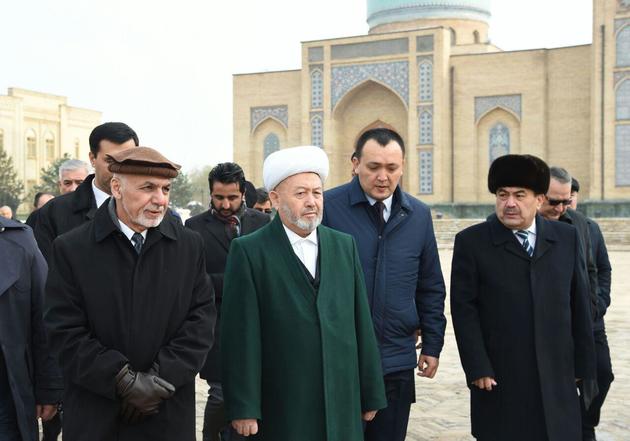Tashkent can provide a platform for inter-Afghan negotiations, which will be attended by representatives of President Ashraf Ghani, his political rival Abdullah Abdullah, as well as the Taliban movement (banned in Russia). The main condition is the exchange of prisoners. On April 7, the first 100 prisoners will leave Kabul prison. The Taliban, in turn, will hand over 20 captured Afghan soldiers.
Uzbekistan already has experience of political consultations in the Afghan settlement and received sanction to become mediator from two major players - the United States and China. However, due to the threat of the spread of coronavirus infection, the date of negotiations hasn't been determined yet. At the end of last week the Afghan Ministry of Peace Affairs announced completion of the formation of the Kabul delegation, which should attend inter-Afghan negotiations with the Taliban.
This became possible after the first meeting between representatives of the Afghan government and delegation of the Taliban movement in Kabul, during which they discussed the issue of exchange of prisoners of war. At the end of February in Qatar, the United States and the Taliban signed first peace agreement in over 18 years of war, which envisages withdrawal of foreign troops from Afghanistan in 14 months and the beginning of the inter-Afghan dialogue. One of the clauses of this agreement was the release of prisoners. By March 10, up to 5 thousand Taliban militants and up to thousand prisoners from the other side were supposed to be released. However, on March 1, Afghan President Ashraf Ghani announced that his government has been excluded from the deal and had not made any promises to release 5,000 Taliban members. Nevertheless, on March 11, Gani signed a decree to pardon and release the Taliban prisoners, specifying that the process will be gradual. After pressure from the United States and calls from other countries to support the peace process, the parties organized meetings to begin the exchange.
Right now the very possibility of negotiations is regarded as a progress, because before all parties - both the Afghan government and the Taliban - refused to engage at all. “Both meeting itself and the agreement reached at it are just historical, they're practically a miracle. True, in order to achieve this, the Taliban captured a county in Badakhshan a week ago to show everyone in Afghanistan that there will be no negotiations with official Kabul without the exchange of prisoners. Of course, this step could be called “terrible blackmail and pressure”, since after that there were also attacks in the Tokhar province, but you can also call it “forceful dialogue”, natural for Afghanistan, because the further you dig, the more obvious it becomes hat the official Kabul doesn't seek peaceful dialogue and does everything possible to disrupt it, for which it has quite good reasons,” Igor Pankratenko, deputy director of the Center for Strategic Assessments and Forecasts, told Vestnik Kavkaza. The main reason, according to the expert, is a one-billion-dollar reduction in US aid to Kabul: “It's a huge blow for the central government. But it also brings huge results. The exchange schedule and the list of people involved in the exchanged were agreed on over the week. It's assumed that the exchange will be carried out according to formula 100 for 20 people every day. On April 7, the first batch should leave the Kabul prison."
After the exchange of prisoners process is completed, general inter-Afghan negotiations should begin. But not everything is going smoothly. The Taliban doesn't approve the list of delegation that will negotiate on behalf of Kabul. Mohammad Masum Stanikzai, former head of the National Security Directorate, was chosen as the head of the delegation, and other participants include people close to Ashraf Ghani, Abdullah Abdullah and other political leaders. Delegation also includes five women, including Khabib Sorabi, who serves as deputy chairman of the Supreme Peace Council.
Kabul called this list "inclusive." Nevertheless, former Prime Minister Abdullah Abdullah made it clear that his approval shouldn't be taken as a sign of resolving the political crisis that arose after the announcement of the presidential election results. Ex-Prime Minister also noted that change in the composition of delegation is possible. "There's fair criticism regarding composition of this delegation, but the beginning of negotiations is very important for us," afghanistan.ru quoted Abdullah as saying.
While previous inter-Afghan meetings took place with participation of heavyweight politicians, this time their representatives will have to conduct dialogue with the Taliban. This gives delegation function of a "postman". This approach makes it impossible to sign agreements immediately at the negotiation table. That's why the Taliban say that there's no one to negotiate with, and they are conducting separate negotiations with Abdullah Abdullah, hoping to join forces with him against Ghani.
Nevertheless, Tashkent welcomed the agreement of leaders of Afghanistan on the formation of an "inclusive" negotiation team and sees this as a decisive step on the way towards peaceful resolution of the domestic political crisis in the country, press service of the Foreign Ministry of Uzbekistan said.
Supporting its words, Uzbekistan sent the first batch of humanitarian aid to Afghanistan to combat the spread of coronavirus infection. The cargo sent by the train via the Angren-Tashkent-Termez-Mazari-Sharif route includes special clothing for medical workers, medical masks, pyrometers, food, soap and clothes for children.






